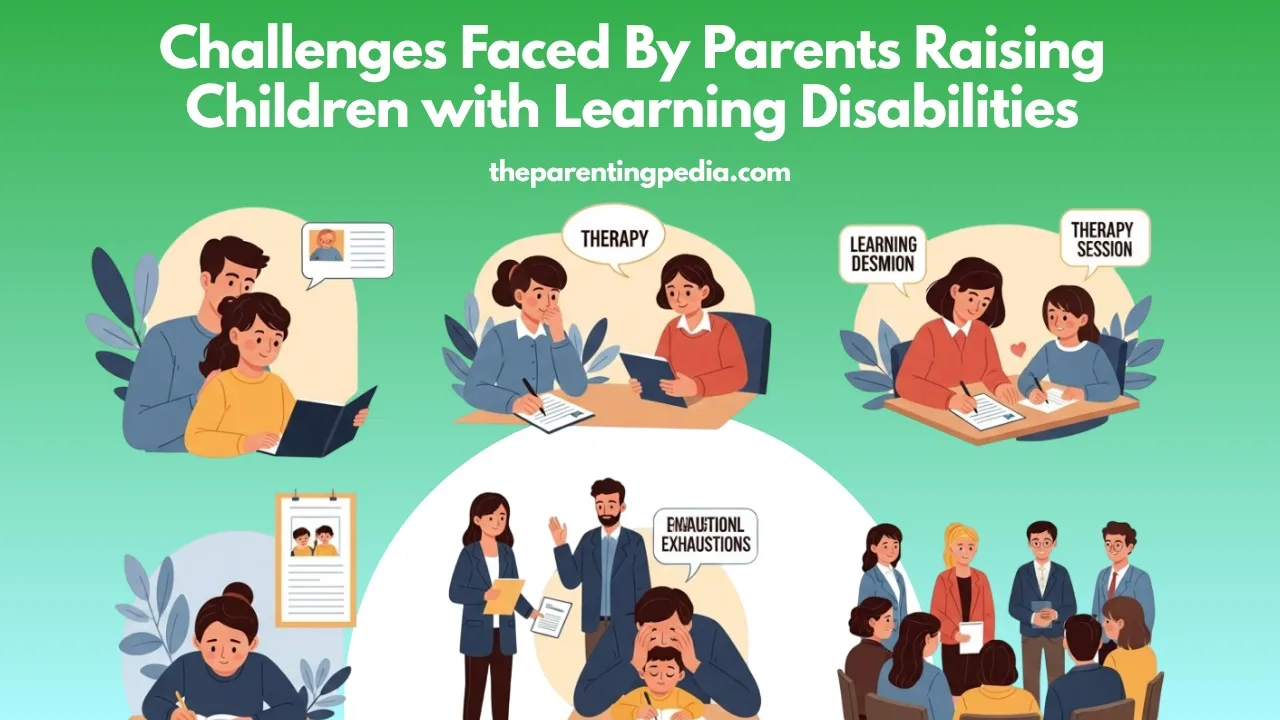Raising a child is a journey full of joys and challenges. But when a child has a learning disability, the journey becomes even more complex and demanding. Learning disabilities affect how a child understands, process or communicates information. These children may struggle with reading, writing, mathematics etc. While such children may be intelligent and capable, they often learn in ways that are different from most children. For parents, this can be a confusing and emotional experience. They may feel worried, frustrated, overwhelmed or even helpless. Understanding the unique challenges parents face is important, not only for them but also for schools, communities and society at large. Let’s explore main challenges these parents face and how they can manage them effectively.
1. Delayed Diagnosis And Lack Of Awareness
One of the first major challenges is identifying that a child has a learning disability. Many parents may not notice the early signs or they may confuse them with laziness or lack of interest in studies. Schools may also overlook the signs especially in early years. Often, learning disabilities are not diagnosed until the child is already facing academic failure, low confidence or behavioral issues. This delay can cause emotional stress for both the child and the parents. Lack of awareness about learning disabilities in many communities and schools adds to the problem.
Steps That Can Help:
- Learning about the signs of common learning disabilities like dyslexia, ADHD etc.
- Consulting with professionals such as pediatricians, psychologists or special educators early.
- Encouraging schools to perform assessments when a child consistently struggles with academics.
2. Emotional Stress And Mental Health
Parents of children with learning disabilities often experience emotional ups and downs. They may blame themselves or feel guilt for their child’s difficulties. They may also feel isolated, especially if others around them don’t understand what they are going through. In many cases, extended family members, neighbors or even friends may offer unhelpful advice or criticism, which increases pressure. Watching their child struggle in school or lose confidence can be heartbreaking for any parent.
Steps That Can Help:
- Seeking emotional support from parent support groups or counseling services.
- Practicing self care and managing stress through healthy habits.
- Speaking openly with trusted people and professionals to share feelings and seek help.

3. Academic Struggles And School Support
One of the most obvious challenges is helping the child with schoolwork. Children with learning disabilities often fall behind in school even if they try their best. They may get low grades, feel frustrated or even avoid school altogether. Parents may find it hard to understand school systems, special education terms or what rights their child has. Sometimes, teachers may not be trained to handle learning difficulties and schools may not offer enough support.
Steps That Can Help:
- Requesting an Individualized Education Plan or special accommodations for the child.
- Working closely with teachers, special educators and counselors.
- Learning about educational rights and laws that protect children with disabilities.
4. Behavioral Issues And Social Struggles
Children with learning disabilities may also have behavior problems due to frustration or lack of understanding. They might act out, become aggressive or avoid doing homework. They may feel embarrassed or anxious in school. These children often struggle to make friends or may be teased or bullied by peers. Social rejection can lower their self-esteem and make them feel isolated.
Steps That Can Help:
- Teaching children social skills and helping them build confidence.
- Encouraging positive peer interactions through hobbies, activities or support groups.
- Seeking behavioral therapy if needed to help with anger, anxiety or low mood.
5. Time And Financial Pressure
Helping a child with a learning disability often requires extra time and money. Parents may need to attend therapy sessions, hire tutors or invest in special education tools. This can be financially stressful, especially for families with limited resources. Managing appointments, homework, school meetings, and daily responsibilities can feel like a full-time job, especially if both parents work.
Steps That Can Help:
- Exploring government schemes or NGOs that offer free or affordable services.
- Planning a weekly schedule to balance work, family and child needs.
- Asking for help from family to reduce the burden.
Also Read: The Influence Of Extended Family On Raising Children
6. Lack of Acceptance from Society
In many cultures, there is still stigma around learning disabilities. People may think the child is not smart enough or lazy and parents may feel ashamed to talk about their child struggles. This societal pressure can stop families from seeking help or delay the child progress. Sometimes, even schools may label a child unfairly without offering support.
Steps That Can Help:
- Creating awareness by talking about learning disabilities openly and confidently.
- Educating friends, family and others to remove myths and misunderstandings.
- Teaching children that their value is not based on grades but on their strengths and efforts.
7. Balancing Hope and Realism
Parents naturally hope that their child will succeed but when progress is slow, it can lead to disappointment. It is difficult to find the right balance between encouraging the child and accepting their limits. Some parents may push too hard without realizing their child needs time and space. Others may give up easily thinking nothing will help. This emotional balance is hard to maintain.
Steps That Can Help:
- Setting realistic short term and long term goals with the help of educators or therapists.
- Celebrating small achievements and progress not just academic success.
- Remembering that every child grows at their own pace and has unique strengths.
8. Siblings and Family Dynamics
Sometimes, siblings of a child with learning disabilities may feel neglected. Parents naturally focus more on the child who needs more help but this can create tension or jealousy in the family. It can also affect the relationship between parents as stress levels increase and time becomes limited.
Steps That Can Help:
- Involving all children in open, honest discussions at an age-appropriate level.
- Spending quality time with each child individually.
- Supporting each other as partners and seeking couple counseling if needed.

Conclusion
Parenting children with a learning disabilities comes with unique challenges. From delayed diagnosis to emotional stress, from academic support to social struggles, the journey can be overwhelming. However, with the right knowledge, patience and support, it is possible to help the child development. What matters most is that parents never give up. Their love, understanding and efforts can change the life of a child who learns differently. A learning disability is not a failure, it is just different way of learning. With the right environment, these children can grow into confident, successful and happy individuals.
FAQ
What are the challenges faced by parents of children with learning disabilities?
Parents of children with learning disabilities face challenges like late diagnosis, emotional stress, academic struggles, behavior problems and social stigma. They often deal with financial strain, lack of support and balancing their child’s needs with family life, making it hard for them to stay positive while helping their child succeed.
What are the effects on parents with children with disabilities?
Parents of children with disabilities often experience stress, anxiety, guilt and emotional exhaustion. They may face financial strain, social isolation and strained family relationships. Constant caregiving demands can impact their mental and physical health, while balancing hope and worry about their child’s future can feel overwhelming and emotionally draining.
